Why do gender imbalances still persist in the scientific world? Why is it that we hardly find women in certain fields? Are women scientists facing similar challenges today as they did 20 years ago? Do we need new role models and new narratives to attract younger generations to science? Are gender equality plans helping correct the situation? And how does Open Science help us reach a more egalitarian society?
Last Friday, 11 February, in the context of the International Day of Women and Girls in Science, ten women from EELISA ecosystem met online to discuss these and other topics. They shared with the audience their very personal and intimate experiences, their views and advice, but also their fears and hurdles.
Set in an intimate and casual atmosphere, they all agreed on the importance of building a strong women’s network and understood mobility as the key component for women to have a successful career. Going abroad means stepping out of your comfort zone, it means building resilience, knitting a broad network, and generating new knowledge. However, mobility does not come without some compromises. Indeed, although panelists agreed on the importance of mobility, there was also a lively debate on the challenges that come attached to it – Is mobility a choice or an obligation? How can we be a mother and a scientist? Is it possible to have children and strike a good work-life balance?
The need to have new role models and to spur scientific careers from a very early age was also largely debated. The scientific world needs more ‘Silvias’ (girls like the character of the book “Forest is our home” by one of the panelists) and more ‘Elisas’. We need to generate more narratives that draw new female role models: girls can and do operate chainsaws, drive trucks and do science. However, participants also agreed to highlight that we need to be careful with these “new narratives” to avoid the creation of a discourse based on an ideal “super-woman” that must be perfect at everything. They also emphasized the need to organize more panels like this and that is time to take female researchers and scientists out of the closet and make them visible. And this is what these roundtables are all about!
- Post by Isabel Salgueiro UPM – EELISA InnoCORE Team & EELISA Narrator
Did you miss the roundtable? You can watch it again HERE
You can also access notes about the roundtable by panelist Burcu Bulut (ITU) here.
MEET THE HOSTS:
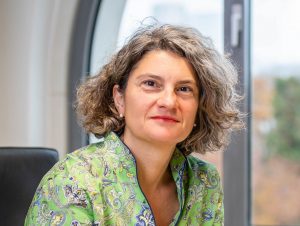
Maria RENTETZI – Chair of Science, Technology, and Gender Studies at Frederich Alexander University in Germany.
Her research works are at the intersection of science and technology studies, nuclear diplomacy, and gender. She is an affiliate of the Max Planck Institute for History of Science (MPIWG), was a guest professor at TU Berlin, a Silverman Professor at Tel Aviv, and a professor at the National Technical University of Athens (NTUA). She is also an award-winning scholar and author.
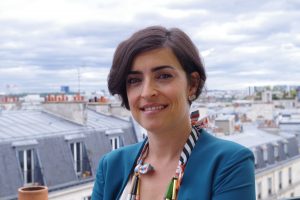
Sofia d’AGUIAR – EELISA Executive Director
She was the Head of Innovation & Digital Transformation at SNCF (France’s national railway company) where she worked for over 10 years managing teams in innovative transversal projects and piloting the digital transformation process of the company. Sofia holds a Ph.D. in Geotech and Environmental Engineering and was nominated ¨Women of the Industry, Research, and Development¨ by the prestigious business and technology magazine L’Usine Nouvelle.
MEET THE PANELISTS
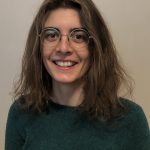
Romane BOUTILLIER – PhD student (ENPC)
After two years of preparatory classes in math and physics, she studied civil engineering and architecture at the ENPC and at the architecture school of Marne la Vallée. After engineering school, she did an internship at the Navier laboratory (ENPC, Gustave Eiffel University) where she is currently doing her Ph.D. Her work focuses on the topological exploration of grids for surfaces in architecture.
“As a high school student, I was fortunate enough to participate in a program that promoted young women to engineering careers. I think this program, which is not very common, has had a significant impact on me. I am well aware that I work in a male environment, and I am happy to be able to exchange with women from other universities”
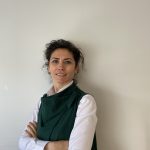
Burcu BULUT – Librarian (ITU)
She received her Ph.D. degree from Ankara University, Department of Information and Records Management in 2011. She joined Istanbul Technical University in 2019 as a technical services librarian and she has played an active role in promoting open access as a group member of the Open Access Infrastructure for Research in Europe (OpenAIRE) She is currently a member of ITU EELISA InnoCORE (EELISA Strategic Framework for Open Science Practices).Her areas of expertise include digital libraries, e-resources management, open access, institutional repositories, information retrieval systems and information-seeking behaviors.
“As a woman, librarian, and open science advocate, I believe in the power of sharing experiences to bring an inclusive perspective to women’s issues. We come from different cultures, but we are mostly influenced by similar things. If we want to change the society we are a part of, we need to learn from each other and develop a common understanding to make a difference through communities.”

Borbala SCHENK – Administration (research management, BME)
Chief European Research Funding Advisor of the Budapest University of Technology and Economics (BME) specializing in European research funding framework programs (H2020, Horizon Europe). Supporting researchers with a wide portfolio of tasks including grant advocacy, consortium building, and proposal-writing. Lawyer by degree, 15+ years of experience in research and university environments, having held management, lecturing, and editorial positions.
“I was the leader of the Task Force responsible for preparing the Gender Equality Plan of BME. Also, as a Horizon Europe specialist, I support researchers in setting up gender-inclusive research concepts that meet the requirements of the European Commission.”
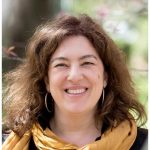
Sonia ROIG – Director of International School of Doctorate (UPM)
She is a Ph.D. in Forestry Engineer and professor at the Department of Natural Resources and Systems at UPM. Her research activity focuses on the dynamics and functioning of forestry systems and silvopasture, generally in rural areas but lately also regarding the urban forests.
She is a member of the research group ECOGESFOR (Ecology and Sustainable Forest Management) and FOBOS (Urban Forestry-Bosque Urbano). She is also the director of UPM International School of Doctorate.
” I have been part of many projects that address gender-related topics. One of them is the publication of a book that aims to show the limitless possibilities of girls in forest studies and the science field”.

Irina SEVERIN – Full professor and vice dean of the Industrial Engineering and Robotics Faculty (UPB)
She is a Ph.D. Metal matrix composite materials in University Politehnica of Bucharest with a research internship in Ecole Centrale de Lyon, France, and thesis presentation in Universite Catholique de Louvain, Belgium. Currently, she works at Politehnica of Bucharest as a Ph.D. director, professor, in research and study programs development.
“Women and girls in Engineering should be resilient, rigorous, committed, exceeding the upper-medium level to succeed; I needed to work hard, to continuously progress and balance emotions. I fully support professional involvement through mobility and cooperation, with enthusiasm and passion for education, with courage and will for results and meanwhile in full preservation of femininity.”
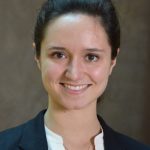
Solène DEMAY – Senior Consultant at Roland Berger (PSL – Mines)
She is MS in Executive Engineering (Cycle Ingénieur Civil) from Mines ParisTech, PSL – Minor in Public Affairs and Innovation (STS, social sciences). She also was a visiting student at MIT. In 2019, she joined Roland Berger as a consultant where her work focused on exploring ecological transition and infrastructure challenges both in the public and private sector. She is also a Co-founder of WoMines PSL and an active member of Sciences ParisTech au Féminin, as well as GEF – two alumni networks for female graduates.
“My interest in joining the conference relies on both my Engineering background and my active participation in female networks. Happy to share my insights of the Engineering school + corporate world and discover the other participants’ ones, who seem to be more aware of the Academia context.”
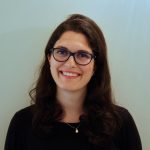
Sara MOCCIA – Assistant professor (SSSA)
She graduated cum laude in Biomedical Engineering at Politecnico di Milano (Milan, Italy) in December 2014. In May 2018, she obtained the European PhD cum laude in Bioengineering from Istituto Italiano di Tecnologia (Genoa, Italy) and Politecnico di Milano. She is currently Assistant Professor at Scuola Superiore Sant’Anna and Affiliated Researcher at Unviersità Politecnica delle Marche. The mission that drives Sara’s research is to improve the quality of healthcare in a data-driven manner. Her research goal is to support physicians throughout the entire process of care, from diagnosis to therapy and follow-up, through artificial intelligence methodologies.
“As a young researcher and assistant professor in Bioengineering at SSSA, I feel the responsibility of contributing actively to gender-related topics. This roundtable is an amazing initiative in this sense, allowing us to share role models, reduce stereotypes, and contribute to diversity management.”
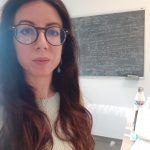 Laura SOMMOVIGO – PhD student (SNS)
Laura SOMMOVIGO – PhD student (SNS)
She is in the last year of her Ph.D. at Scuola Normale Superiore (SNS) in Pisa, Italy. She works on modeling the infrared emission from the first generations of galaxies in the Universe. She is a co-Pi in three accepted telescope proposals at the sub-millimeter interferometer ALMA and she is an active member of the REBELS collaboration, a very recent ALMA large-scale program.
“Together with two other PhD students at SNS we designed a project called: “ISPIRA: Inclusività nelle Scienze, una Possibilità di Identificazione e RAppresentazione”. ISPIRA is a project of scientific divulgation involving early-career female researchers and directed to middle schoolers. The project aims both at providing a possibility of representation and identification to young girls who might be interested in Science and at normalizing the idea of female scientists.”

